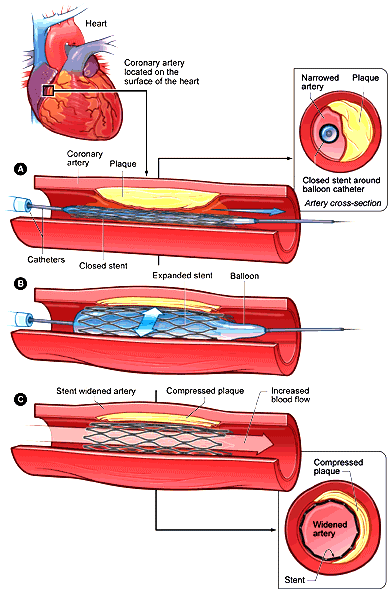A stent is a tube-shaped device that can be inserted into a narrowed passageway or vessel to hold it open. A stent therefore acts as a scaffold that holds bodily tubes open.
The coronary stent is one of the most commonly used types of stent. Coronary artery disease causes a narrowing of the coronary arteries that normally supply blood to the heart muscles. Narrowing of these arteries leads to restricted blood flow to a region of the heart, which can lead to a heart attack or myocardial infarction.
The part of the heart muscle deprived of blood becomes necrotic or dies and so cannot function. The narrowing of the coronary blood vessel is usually caused by atherosclerosis or the build up of fatty deposits that eventually form a plaque. As blood flow becomes reduced, angina or chest pain may occur. Stents are placed within the narrowed arteries to hold them open and restore blood flow.
Implanting a stent
A stent is implanted using a procedure called percutaneous coronary intervention (PCI) or coronary angioplasty. For this procedure, a long, thin tube called a catheter with an inflatable balloon at the tip is inserted into an artery (usually a large artery in the patient's groin) and is threaded through to the heart under the guidance of X-ray imaging.
Once the tip of the catheter reaches the narrowed part of the artery, the tip is inflated to push the artery walls open. Once the artery is widened, the balloon is deflated and removed, while the stent is locked in place, holding open the vessel even after the balloon is deflated.
Around one third of patients who have had their coronary blood vessels dilated with a balloon but have not had stents inserted, have found the vessel narrows again after a few months of balloon angioplasty. This re-narrowing is called restenosis. Stenting helps prevent restenosis.
Nowadays, a more recent type of stent called the drug-eluting stent is available. These stents are embedded with drugs that slowly elute into the coronary artery to prevent the closing of the vessel on a long-term basis. Stents that do not contain drugs are called bare metal stents.
After a stenting procedure, antiplatelet and anticoagulant drugs such as aspirin and clopidogrel can be used to prevent clot formation around the stent and restenosis.

Further Reading
Last Updated: Jun 21, 2023